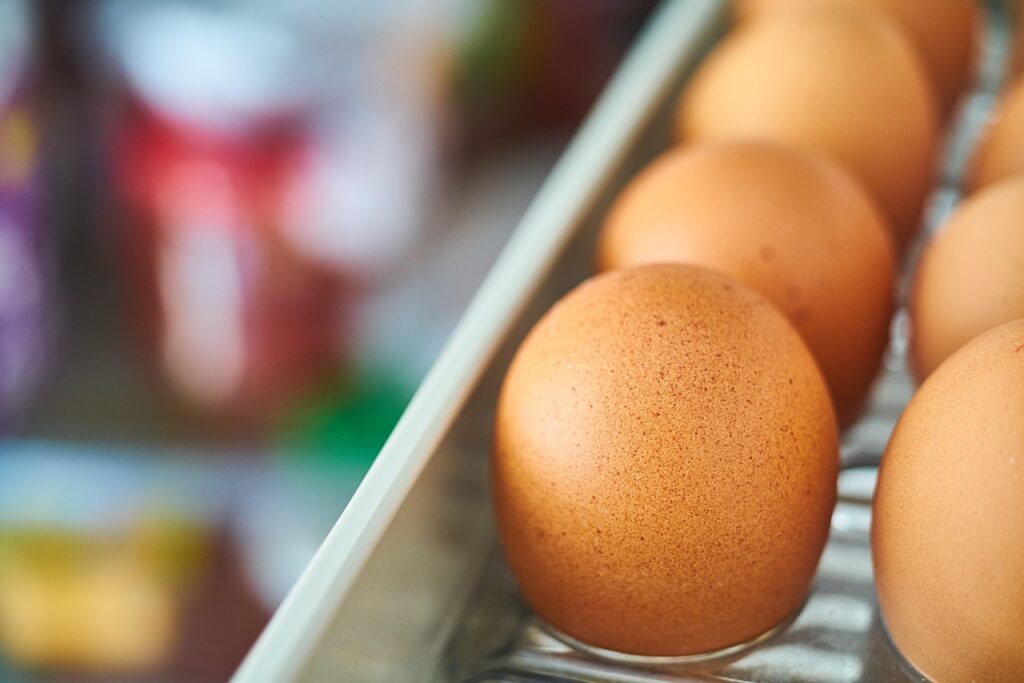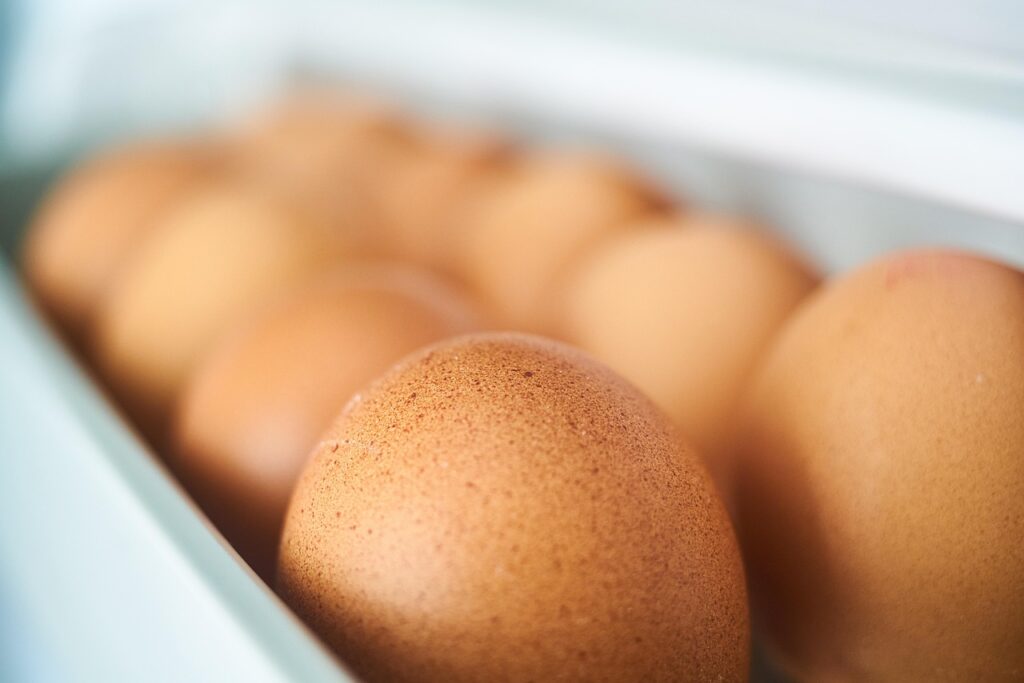Introduction
In the United States, egg safety begins before the carton even hits the shelf. Due to USDA regulations, all commercial eggs are required to undergo a specific washing and sanitization process to remove potential pathogens—particularly Salmonella. While this process is highly effective at eliminating external bacteria, it also strips away the egg’s natural protective coating known as the “bloom.”
Without the bloom, eggs become porous and more susceptible to bacteria if left at room temperature. That’s why, in the U.S., refrigeration isn’t just a suggestion—it’s a safety protocol. Once eggs have been chilled, they must remain chilled to avoid condensation that could reintroduce bacteria.
In short, if you’re buying store-bought American eggs, they must stay refrigerated. Letting them sit out even for a few hours could risk contamination.

Image by Engin Akyurt from Pixabay
The Difference Between American and European Egg Practices
Here’s where things get interesting: not all countries treat eggs the same way. In many European nations, eggs are not washed at all. Instead, the bloom is preserved, allowing for safe room temperature storage. Additionally, European chickens are often vaccinated against Salmonella, further lowering the risk.
| Country | Washed? | Refrigeration Required? | Bloom Intact? | Salmonella Vaccination |
| USA | Yes | Yes | No | Not required |
| UK/Germany | No | No | Yes | Required |
| Australia | No | No | Yes | Recommended |
This international difference is often misunderstood online. If you’re living in the U.S. and following European advice, you could unintentionally risk foodborne illness.
USDA Guidelines on Egg Storage
According to the USDA Food Safety and Inspection Service (FSIS), eggs should be refrigerated at or below 40°F (4°C) immediately after purchase. Here’s a quick breakdown of their storage recommendations:
- Refrigerated shelf life: 3–5 weeks
- Time outside refrigerator: No more than 2 hours at room temperature
- Temperature danger zone: 40°F–140°F (ideal for bacterial growth)
Once eggs are refrigerated, taking them in and out of the fridge increases the risk of condensation forming on the shell, which can draw bacteria inside.
Pro tip: Always store eggs in the coldest part of the refrigerator—not in the door—to ensure a stable temperature.
Room Temperature Risks: How Long Is Too Long?
In most American kitchens, room temperature sits around 68°F to 75°F (20°C to 24°C)—a range that’s perfect for bacterial multiplication. According to food safety experts:
- 2 hours is the maximum safe duration American eggs can remain unrefrigerated.
- Beyond that, bacterial growth—particularly Salmonella Enteritidis—becomes a serious concern.
The USDA’s “2-hour rule” should not be taken lightly. If your eggs have sat out for longer than that, especially in a warm kitchen or during summer, it’s best to toss them.
The Science of Bacterial Growth in Eggs
Let’s break it down: when an egg’s natural bloom is washed away, its defenses are compromised. Bacteria like Salmonella can now penetrate the porous shell, particularly if condensation occurs.
What accelerates contamination?
- Fluctuating temperatures (e.g., taking eggs out and back into the fridge)
- Humidity and condensation
- Unclean surfaces or hands handling the eggs
Once bacteria enter the egg, they can grow rapidly—especially in the yolk, where the nutrient-rich environment acts like a bacterial buffet.

Image by Engin Akyurt from Pixabay
What Happens When Eggs Sit Out Too Long?
Besides bacterial risks, eggs that have been left unrefrigerated start to undergo noticeable changes:
- Yolk flattening: Loss of firmness and shape.
- Runny whites: Albumen thins out and loses viscosity.
- Odor changes: Eggs may emit a slight sulfur or “off” smell.
- Shell weakening: Shell becomes more brittle and prone to cracks.
These physical changes aren’t always visible to the eye, but they’re a clear sign that freshness is declining—and safety might be compromised.
How to Test if an Egg Is Still Safe
Not sure if your eggs are still good? Here are three at-home tests to try:
The Float Test
Fill a bowl with water and gently place your egg inside:
- Sinks and lays flat: Very fresh
- Sinks but stands upright: Still safe but nearing expiration
- Floats: Spoiled—discard immediately
The Sniff Test
A bad egg has a distinct, unpleasant sulfur smell. If you’re unsure, crack it open in a separate bowl first.
The Visual Test
Check for any discoloration, cracks, or unusual textures. Mold or green-gray hues mean the egg has gone bad.
Storing Eggs During Power Outages
During a power outage, your fridge can rise above 40°F pretty quickly. Follow these guidelines:
- Keep fridge closed as much as possible
- Discard eggs if they’ve been above 40°F for more than 2 hours
- Consider using a cooler with ice packs as a temporary backup
Having a fridge thermometer on hand helps you make smart decisions during emergencies.
Can Cooked Eggs Sit Out?
Cooked eggs have their own rules. Whether scrambled, fried, or hard-boiled:
- Maximum safe time: 2 hours at room temp
- Refrigerated shelf life: 3–4 days
- Tip: Store cooked eggs in airtight containers to avoid odor absorption and cross-contamination
Never leave dishes like deviled eggs or egg salad out for parties beyond 2 hours without chilling.
Safe Egg Handling for Meal Prepping
If you’re batch-cooking for the week, here’s how to keep your egg-based meals safe:
- Cook eggs thoroughly (until yolk and white are firm)
- Cool rapidly and store in shallow containers
- Refrigerate within 1 hour of cooking
- Label and consume within 3–4 days
Egg meal prep is a time-saver, but it requires attention to food safety details.
Natural Preservation Methods (Without a Fridge)
Before refrigeration, people used creative ways to keep eggs fresh. While not USDA-approved, these methods can be handy for off-grid living:
- Water glassing (sodium silicate): Can preserve eggs for up to 1 year
- Limewater solution: Alkaline bath to seal the shell
- Oil coating (mineral oil): Mimics the natural bloom by sealing pores
These techniques are best suited for freshly laid, unwashed eggs—not store-bought.

Myths About Refrigerating Eggs
Let’s bust some myths:
- “Refrigerated eggs can sit out for days.” Nope—2-hour rule still applies.
- “Boiled eggs last longer unrefrigerated.” In fact, boiling removes the bloom and makes them more perishable.
- “Organic eggs don’t need refrigeration.” Unless unwashed, they do.
Refrigeration is not about egg type—it’s about processing.
Best Practices for Buying and Transporting Eggs
Protect your eggs from the grocery store to your fridge:
- Check expiration and “pack date” on the carton
- Choose cartons from the back of the fridge section
- Avoid cartons near open doors or lights (higher temps)
- Use insulated bags during warm weather or long drives
Little steps make a big difference in shelf life and safety.
Tips for Backyard Egg Collectors in the U.S.
If you raise chickens at home, here’s what to know:
- Collect eggs daily
- Don’t wash them unless absolutely necessary
- Store unwashed eggs at room temperature for up to 2 weeks (if bloom is intact)
- Once washed, refrigerate immediately
Backyard eggs offer flexibility—but require careful handling.
Frequently Asked Questions (FAQs)
1. How long can American eggs sit out safely?
No more than 2 hours at room temperature, per USDA guidelines.
2. Can I put unrefrigerated eggs back in the fridge?
Yes, but only if they haven’t been out longer than 2 hours. Otherwise, discard them.
3. Why do eggs in Europe not require refrigeration?
European eggs retain their natural bloom and hens are vaccinated against Salmonella, reducing risk.
4. Is it safe to eat eggs that were left out overnight?
No—especially in the U.S., overnight exposure creates high bacterial risk. Discard them.
5. What’s the best way to store eggs at home?
Keep them in their original carton, in the back of the fridge at ≤40°F.
6. Are farm-fresh eggs safe to leave on the counter?
Yes—if unwashed and stored in a cool, dry place. Once washed, they must be refrigerated.

Image by SweetSolo from Pixabay
Conclusion
Egg safety in the U.S. boils down to one golden rule: once refrigerated, always refrigerated. American eggs lose their natural protection during processing, making consistent cold storage essential for preventing contamination. Whether you’re a cautious home cook, a meal prepper, or a backyard chicken keeper, understanding the science and best practices around egg storage is your first step to food safety.
